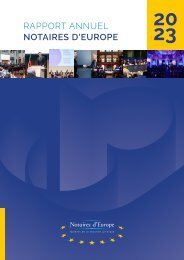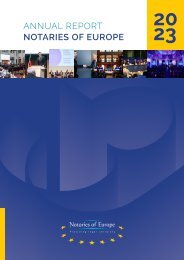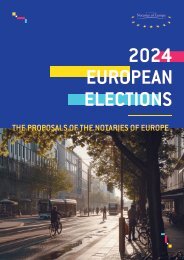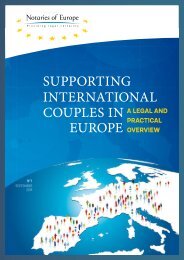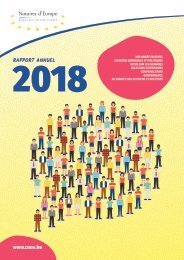CNUE ANNUAL REPORT 2019 EN
Create successful ePaper yourself
Turn your PDF publications into a flip-book with our unique Google optimized e-Paper software.
ANNUAL REPORT
2019
www.cnue.eu
A Year In Review
External Relations
Communications
Management
At The Service Of Citizens And The States
Council of the Notariats
of the European Union
Avenue de Cortenbergh, 120
B-1000 Bruxelles
Tel: + 32 (0)2 513 95 29
Fax: +32 (0)2 513 93 82
E-mail: info@cnue.be
www.notariesofeurope.eu
President’s
Foreword
CNUE Annual Report 2019
In the field of European affairs, 2019 will
remain a special year. First of all, there was
the period of the European elections, which
the CNUE used to get involved in Parliament’s
“This time I’m voting” campaign and to publish
its proposals for action for the new legislature. And
then there was the unpredictable, this endless Brexit
saga, giving us its share of twists and turns almost daily.
Nevertheless, despite the uncertainties, during the many
interviews I conducted with national and European political
leaders, I was able to filter the priorities and main objectives of the
European institutions of interest to the notariat for the coming years.
Notaries are eagerly awaited, for example, on the front line of the fight against money laundering,
an area in which we can highlight our effective cooperation with government authorities. There is
also the question of the increasing digitalisation of the activities of legal professionals. To achieve
this, the European institutions clearly demonstrate their willingness to pool efforts and implement
interoperability solutions on which the notariat must take a position.
In an increasingly connected world, reliability and trust are essential assets that notaries are able to
provide. It is by fully opening up to digitalisation that we will make ourselves indispensable to citizens,
businesses and governments. In organising this year’s CNUE Innovation Prizes at the European
Parliament, we wanted to demonstrate that the European notariat has made a strong commitment
to this, as it has always done.
The award ceremony took place in the context of the Europe Enacted exhibition, which was held
for a week at the European Parliament. This now travelling exhibition highlights notarial acts of
major historical value, preserved in the national archives. It also presents the digital tools created by
notariats to provide a modern and efficient service for their clients and the States.
Through the history and stories it tells, this exhibition makes it possible to better define the notariat’s
identity. The notariat is the profession of authenticity, truth, certainty and conservation of the data on
which the trust of States and our fellow citizens is based. At a time when false information, falsified
data and money laundering are on the rise, this truth and certainty are more than ever essential to
society.
Because, let us never forget it: a Europe that protects, a Europe that is close to the citizens, is a
Europe that needs its notaries.
Pierre-Luc Vogel
2019 CNUE President
1
A YEAR IN REVIEW
Contents
3
18
19
22
19
A YEAR IN REVIEW
EXTERNAL RELATIONS
COMMUNICATIONS
MANAGEMENT
AT THE SERVICE OF CITIZENS
AND THE STATES
2
CNUE Annual Report 2019
A
YEAR IN
REVIEW
3
A YEAR IN REVIEW
CNUE – Transfer of Powers
16 January 2019
Hosted by the Conseil supérieur du notariat
français, the 2017 and 2018 CNUE Boards met
in Paris on 16 January 2019 for the transfer of
powers ceremony. On this occasion, Mr Marius
Kohler handed over the reins to his successor
as President of the CNUE, Mr Pierre-Luc Vogel.
In the presence of the President of the
Notaries of France, Mr Jean-François Humbert,
and Mr Thomas Andrieux, Director of Civil
Affairs and the Seal, Mr Vogel detailed the main
lines of his work programme for 2019, with a
view to Brexit and the European elections.
4
CNUE Annual Report 2019
Application of European Regulations on Matrimonial Property Regimes
and Registered Partnerships
29 January 2019
European Regulations 2016/1103 on matrimonial
property regimes and 2016/1104 on the property
consequences of registered partnerships
became applicable on 29 January as part of
an enhanced cooperation procedure currently
involving 18 Member States: Austria, Belgium,
Bulgaria, Croatia, Cyprus, Czech Republic,
Finland, France, Germany, Greece, Italy,
Luxembourg, Malta, Netherlands, Portugal,
Slovenia, Spain and Sweden.
Thanks to these two Regulations, the conflict
of laws rules are now unified between the
Member States participating in the enhanced
cooperation to determine the applicable law
and the competent court which will decide
on the division of assets in the event of, inter
alia, separation of the couple or death. These
laws will have a definite impact on the work of
notaries and international couples in Europe.
This is why the CNUE is taking action through
training and practical tools.
5
A YEAR IN REVIEW
Notaries of Europe Join European Parliament’s
“This Time I’m Voting” Campaign
29 March 2019
At its General Assembly on 29 March 2019,
the CNUE decided to join the European
Parliament’s “This time I’m voting”
campaign. This pan-European and nonpolitical
campaign aimed to encourage as
many people as possible to vote in the
European elections in May 2019. The CNUE’s
aim: to ensure that the abstentionist party
was not the main European party.
In the presence of the European
Parliament’s director for communications
with citizens, Mr Stephen Clark, the CNUE
support was formalised with the signature
of a Memorandum of Understanding, under
which the CNUE undertook to promote the
campaign among notaries and citizens.
6
CNUE Annual Report 2019
European Directory of Notaries revamped
2 April 2019
The CNUE unveiled on 2 April the new version of its European Directory of Notaries:
www.notaries-directory.eu
Created in 2011 and available in 23 languages, the Directory lists the approximately 45,000 notaries of
Europe across the 22 countries of the European Union that are familiar with the notarial system. It gives
access to the notaries’ contact details and also lists the languages spoken. The European Directory of
Notaries is the result of a long-standing partnership with the European Union, which provided financial
support for its creation.
CNUE meets in London to discuss
the consequences of Brexit
15 April 2019
The CNUE held a discussion session on
15 April in London on the consequences
of Brexit in the field of civil justice. In the
prestigious setting of the Residence of
France, British practitioners were invited to
share their opinions on the ongoing political
process and the concrete consequences for
citizens in terms of family law, inheritance
law and the fight against money laundering.
The Ambassador of France to the United
Kingdom, Mr Jean-Pierre Jouyet, honoured
the participants with his presence. When
asked about the ongoing negotiations,
his comments perfectly illustrated the
complexity of the issue, both at legal
and political levels. Mr Pierre-Luc Vogel,
President of the CNUE, assured him that
all European notariats would be called
upon to assist citizens living in the United
Kingdom or on the Continent in dealing with
the many legal issues that will arise in their
daily lives.
7
A YEAR IN REVIEW
31 st Conference of European Civil-Law Notaries
25-26 April 2019
On 25 and 26 April, the Austrian notariat
held the 31 st edition of its Conference of
European Civil-Law Notaries in Salzburg
with the theme: “Europe as a Unifying
Principle - Ambition & Realisation”. Brexit,
the migration crisis and Euro-critics on the
rise throughout Europe: the European Union
is faced with existential challenges. At this
meeting, the discussion covered the threats
of European disintegration and the root
causes of the political transformations of
recent years.
In particular, the programme focused on
the progressing digitalisation in company
law and the ever-growing interconnection
of registers against the backdrop of the
implementation of the European company
law package. Among other things, under
the recent Directive (EU) 2019/1151, Member
States must now ensure that limited liability
companies can be incorporated entirely
online without the founders having to appear
in person before a court, notary or any other
body competent under national law.
8
CNUE Annual Report 2019
Publication of Notaries of Europe
Proposals for European Elections
2 May 2019
With a view to the European elections, at
the beginning of May the CNUE unveiled its
manifesto for future MEPs and members of the
College of the European Commission. In the
context of the increasing internationalisation of
family and economic relations, the CNUE was
seeking through this manifesto to make a series
of recommendations and proposals in order
to respond better to the needs of practitioners
and citizens.
The CNUE identified five main themes in its fields of
action to be addressed by the European Union:
1. Fostering the development of non-contentious justice
in Europe
2. Facilitating the settlement of successions in Europe
3. Supporting families in Europe
4. Protecting the vulnerable
5. Acting in the fight against money laundering
The CNUE manifesto is available at the following link:
http://www.notaries-of-europe.eu/files/
publications/cnue-manifesto-en.pdf
9
A YEAR IN REVIEW
Meeting of the
European Notarial Network
23-24 May 2019
For its first annual meeting, the European
Notarial Network (ENN) held a two-day event
in Ljubljana, the capital of Slovenia. On 23 May,
a seminar on family law and data protection
was held in the context of the first anniversary
of the application of the European GDPR
Regulation. Pierre-Luc Vogel, President of the
CNUE, opened the debates in the presence
of Sonja Kralj, President of the Chamber of
Notaries of Slovenia, and the State Secretary
for Justice Gregor Strojin. Jaša Vrabec, Chair of
the working group on the evaluation of judicial
systems of the European Commission for the
Efficiency of Justice (CEPEJ, an emanation of
the Council of Europe), was also among the
speakers.
He spoke with Pierre-Luc Vogel: an opportunity
to highlight the excellent working relationship
with the CNUE.
On 24 May, the day was devoted to the meeting
of the ENN interlocutors. The participants
reviewed the various actions planned for
2019, in particular those involving European
Commission co-funding: the organisation of
workshops, the creation of a database for
company representation rights in the Member
States, the updating of CNUE information
websites and increased communication with
European notaries to acquaint them with
the platform. The participants also initiated a
reflection to improve the functioning of the
ENN by optimising its operational usefulness on
the basis of an audit and proposals made by
the Hungarian notariat.
10
ttdfscv
CNUE Annual Report 2019
CNUE Plenary General Assembly
20-21 June 2019
The CNUE member and observer notariats
met in Saint-Malo (France) on 20 and 21 June
2019 for the annual Plenary General Assembly.
The first day was devoted to working sessions
on competition law and new technologies,
with external speakers. The aim was to foster
exchanges between members and to raise
awareness of national situations and initiatives.
The second day was dedicated to institutional,
statutory and political issues. In particular, an
experimental reorganisation of the working
structures of CNUE was adopted. With respect
to data protection, the CNUE General Assembly
gave the go-ahead for the adoption of an action
plan for better exchange of good practices and
the implementation of awareness-raising and
training activities.
The fight against money laundering is one of
the CNUE’s other main priorities, in line with
the European institutions.
The tttThe Plenary General Assembly
in Saint-Malo (France)
While the Commission has brought numerous
actions against Member States for failure to
transpose the Fourth Directive correctly, the
Fifth Directive must be transposed into national
law by 10 January 2020.
The notariat is active in this context: at national
level, it cooperates effectively with national
authorities and, at global level, it is involved
in the work of the Financial Action Task Force
(FATF). At the General Assembly, the notariats
agreed to set up a common strategy, including
the establishment of a framework for risk
analysis.
11
A YEAR IN REVIEW
Presentation of the new College of
European Commissioners
10 September 2019
The President of the European Commission,
Ursula von der Leyen, unveiled the
composition of her College on 10
September. The Belgian Didier Reynders
inherits the position of Commissioner
for Justice, which includes many areas
of competence of direct interest to the
European notariat (consumer protection,
civil justice, etc.). Didier Reynders comes
from the Belgian liberal family (Mouvement
Réformateur). He has served as Minister of
Finance (1999-2004 and 2007-2011), Foreign
Affairs (2011-2018) and Defence (since the
end of 2018).
Continuing Jean-Claude Juncker’s efforts,
Ursula von der Leyen has created Vice-
President positions to supervise several
Commissioners. Specifically, Věra Jourová
becomes Vice-President of the European
Commission, responsible for Values and
Transparency. During the last legislature,
Věra Jourová was in charge of the Justice
portfolio. This area will remain under her
supervision.
The CNUE congratulates the Commissioners
on their appointment. It stands ready to
work with them on their policy priorities for
the next five years.
12
CNUE Annual Report 2019
CNUE publishes its first mook, devoted to family law
20 September 2019
As part of the Training III programme “Europe
for Notaries – Notaries for Europe”, the CNUE
published in September the first issue of
a “mook” on European family law. In the
context of the application of the two European
regulations on matrimonial property regimes
and registered partnerships, the publication
is intended for legal practitioners who wish to
explore the subject in greater depth through
articles by notaries and academics, better
understand the CNUE’s training activities and,
finally, discover the various practical tools at
their disposal. The CNUE is already preparing
for early 2020 a second issue that will be
devoted to the other theme of the training
programme: the fight against money laundering.
The publication is available at the following link:
http://www.notaries-of-europe.eu/files/
publications/CNUE-Supporting_Couples_120919.
The “Europe for Notaries - Notaries for
Europe” programme takes place over two
years, from 2018 to 2020. With the European
Union’s support, it involves the organisation,
in partnership with the national notarial
authorities, of 21 seminars in 14 Member
States. This programme responds to the
European Commission’s aim to offer at least
half of legal professionals in Europe the
opportunity to follow European training at
local, national or European level by 2020. In
its evaluation report on the European judicial
training strategy published on 25 October,
the European Commission announced that its
objectives had now been achieved.
13
A YEAR IN REVIEW
Meeting with the President of the
CEPEJ, Mr Ramin Gurbanov
23 September 2019
On 23 September, CNUE President Mr Pierre-
Luc Vogel met Mr Ramin Gurbanov, President
of the Commission for the Efficiency of
Justice (CEPEJ) of the Council of Europe.
As an observer member of the CEPEJ since
2012, the CNUE is involved in several of its
working groups: GT-EVAL and GT-MED. During
the meeting, the two presidents discussed,
in particular, the joint projects between the
two organisations: the drafting of reports on
the efficiency of the notarial profession in
cooperation with GT-EVAL and on notarial
mediation with GT-MED.
Meeting of the European Notarial
Network
26-27 September 2019
The ENN interlocutors met for their second
annual meeting in Riga, Latvia. On 26
September, they reviewed the projects
underway for 2019 and the future projects
that will be started in 2020: the creation
of new tools and functionalities for the
platform, the updating of CNUE information
websites, promotion of the ENN to notaries,
etc. On 27 September, a seminar on the
fight against money laundering gave some
100 participants of more than 22 different
nationalities the opportunity to attend
practical interventions and workshops led
by several international experts in the field.
14
CNUE Annual Report 2019
Meeting with the Croatian
Minister of Justice,
Mr Dražen Bošnjaković
24 octobre 2019
With a view to the upcoming Croatian
EU Council Presidency in the first half of
2020, CNUE President Pierre-Luc Vogel
met with Croatian Minister of Justice
Dražen Bošnjaković. The discussions were
held in Zagreb on the margins of the 25th
anniversary celebrations of the Croatian
notariat. In particular, they made it possible
to elaborate on the central role played by
notaries in family law and real estate law.
4 th Edition of Notaries of Europe
Open Days
25 October 2019
For the 4 th edition of the Notaries of Europe Open Days, the CNUE held events in 14 European Union
countries: Austria, Belgium, Croatia, Czech Republic, Estonia, Germany, Greece, Italy, Netherlands,
Poland, Romania, Slovakia, Slovenia and Spain. The programme included information sessions,
conferences and free consultations attended by several thousand people. The list of events is available
on the Council of Europe website: https://www.coe.int/en/web/cepej/events/european-day-of-justice.
The Notaries of Europe Open Days are part of the European Day of Justice, an initiative of the European
Commission and the Council of Europe that takes place every year around 25 October. Its objective is
to bring justice closer to citizens, inform them about their rights and promote the work of the Council
of Europe and the European Commission in the field of justice.
15
A YEAR IN REVIEW
Europe Enacted Exhibition
11-15 November 2019
The travelling exhibition “Europe Enacted”
took place at the Brussels headquarters
of the European Parliament from 11 to 15
November 2019. The exhibition aimed to
highlight notarial acts of major historical
value, preserved in the national archives.
From the 13 th to the 20 th century, the acts
selected reflect the richness of Europe’s
heritage: the will of Queen Isabel la Católica,
the award of the George Cross to the
Maltese nation, the renunciation document
signed by Archduchess Marie-Antoinette
of the crowns belonging to the House of
Austria, etc. The exhibition also presents the
digital tools created by notariats to provide
a modern and efficient service for their
clients and the States.
Exhibition website:
www.notariesofeurope-exhibition.eu
16
CNUE Annual Report 2019
On 13 November, the CNUE held an opening
ceremony attended by representatives of
the 22 notariats of the European Union, the
European institutions and the Member States.
MEP Angelika Niebler (EPP, Germany), patron of
the exhibition, opened the ceremony alongside
Jens Bormann, President of the German
notariat, Thierry Thomas, exhibition curator,
and Pierre-Luc Vogel, President of the CNUE.
On this occasion, Mr Vogel announced the
winners of the first CNUE Innovation Prizes.
Prizes were awarded to the European
notariats’ most innovative projects. The
following received an award:
- Special Prize of the Presidency: the Austrian
and German notariats for their online company
creation systems.
- Prize for Administrative Services: the
Hungarian notariat for the implementation of
an online payment order procedure.
- Client Relations Prize: the Belgian notariat
for the implementation of “Biddit”, the online
platform for real estate auctions.
- Notary Services Prize: the Italian notariat for
its “NotaioSmart” project, a system for creating
intelligent contracts.
- Special Prize of the Jury: the Maltese notariat
for its “Notarypedia” project, which aims to
make the knowledge space available in the
national archives more easily accessible and
searchable by researchers and the general
public.
17
EXTERNAL
RELATIONS
European Notarial Associations
The CNUE is proud to give administrative and logistical
support to the various notarial organisations set up under
its impetus, such as EUFides and the ENRWA. The CNUE
organises and hosts these associations’ General Assemblies
and Board meetings.
ENRWA
www.arert.eu
The ENRWA works on the interconnection of
registers of wills and European Certificates
of Succession (ECS) in Europe. Fifteen
registers of wills and three ECS registers are
now interconnected thanks to the ENRWA.
Each year the network registers more than
2500 queries and finds more than 350 wills
in a foreign register.
On 16 July 2019, the ENRWA obtained cofunding
from the European Commission
to implement the RERT’Improv project,
which aims to optimise the interconnection
of the registers of wills and ECSs through
two actions. The first will be to increase
the performance of the IT platform, by
improving the finesse and quality of the
information exchanged. The second aims
to increase the network’s visibility by
communicating effectively with notaries.
This two-year project should increase the
number of queries, as well as the number of
cases in which a will is found or there is the
certainty of the absence of a will.
EUFIDES
www.eufides.eu
EUFides is a secure collaboration platform
that facilitates cooperation between
European notaries dealing with crossborder
cases. Originally designed to deal
with cross-border real estate transactions,
EUFides now makes it possible to handle
succession and company law files.
CNUE Annual Report 2019
COMMUNICATIONS
Information Websites
The Notaries of Europe provide the general public
with thematic information websites:
Successions in Europe:
www.successions-europe.eu
Couples in Europe:
www.couples-europe.eu
Buying property in Europe:
www.buyingmyhome.eu
The Vulnerable in Europe:
www.the-vulnerable.eu
Authentic Acts in Europe:
www.authentic-acts.eu
These websites are multilingual and provide an overview of the national law of the Member
States. In short, these are valuable tools to consult before going to see your notary!
19
COMMUNICATIONS
European Directory of Notaries
www.notaries-directory.eu
The directory lists the data
of around 45,000 European
notaries. Searches can be
done on the basis of country,
language spoken or name.
European Notarial Network
www.enn-rne.eu
The European Notarial Network
(ENN) assists notaries in the
handling of cross-border cases
by offering a range of practical
and informative tools via a
secure platform.
Social Media
Follow the CNUE on Twitter @EUnotaries to find out the latest news,
events, publications and press releases.
Discover the CNUE’s account:
www.twitter.com/EUnotaries
Join the Notaries of Europe community at:
www.linkedin.com/company/council-of-thenotariats-of-the-european-union
YouTube
Discover the last CNUE’s videos:
www.youtube.com/user/EUNotaries
20
MANAGEMENT
CNUE Annual Report 2019
The CNUE in Brief
The Council of the Notariats of the European Union (CNUE) is
the official body representing the notarial profession in dealings with
the European institutions. Speaking for the profession, it has negotiating
and decision-making powers on behalf of all the notariats of the European
Union, so some 45,000 European notaries and their 200 000 staff.
The CNUE represents the notariats of the EU Member States familiar with
this institution: Austria, Belgium, Bulgaria, Croatia, the Czech Republic,
Estonia, France, Germany, Greece, Hungary, Italy, Latvia, Lithuania,
Luxembourg, Malta, the Netherlands, Poland Portugal, Romania, Slovakia,
Slovenia and Spain. The notariats from the Republic of North Macedonia,
Montenegro, Serbia and Turkey have observer member status.
Video presenting the CNUE:
https://www.youtube.com/watch?v=2oDCZ0zb-GU&t=172s
21
MANAGEMENT
Full Members
1) Austria
Österreichische Notariatskammer
Number of notaries: 519
12) Latvia
Latvijas Zvērinātu notāru padome
Number of notaries: 106
2) Belgium
Conseil International du Notariat Belge
Number of notaries: 1 605
13) Lithuania
Lietuvos Notaru Rumai
Number of notaries: 252
3) Bulgaria
Chambre des Notaires de Bulgarie
Number of notaries: 675
53, boulevard Joseph II
14) Luxembourg
Chambre des Notaires du Grand-Duché
de Luxembourg
Number of notaries: 36
4) Croatia
Hrvatska javnobilježnička komora
Number of notaries: 324
15) Malta
Kunsill Notarili ta’ Malta
Number of notaries: 359
5) Czech Republic
Notarska komora Ceske republiky
Number of notaries: 444
16) The Netherlands
Koninklijke Notariële Beroepsorganisatie
Number of notaries: 1 264
6) Estonia
Eesti Vabriigi Notarite Koda
Number of notaries: 91
17) Poland
Krajowa Rada Notarialna
Number of notaries: 3 553
7) France
Conseil Supérieur du Notariat Français
Number of notaries: 14 968
18) Portugal
Ordem dos Notarios Portugal
Number of notaries: 417
8) Germany
Bundesnotarkammer
Number of notaries: 7 088
19) Romania
Uniunea Naţională a Notarilor Publici
din România
Number of notaries: 2 412
9) Greece
Conseil National du Notariat Grec
Number of notaries: 2 872
20) Slovakia
Notárska komora Slovenskej republiky
Number of notaries: 346
10) Hungary
Magyar Országos Közjegyzoi Kamara
Number of notaries: 315
21) Slovenia
Notarska Zbornica Slovenije
Number of notaries: 93
11) Italy
Consiglio Nazionale del Notariato
Number of notaries: 4 970
22) Spain
Consejo General del Notariado
Number of notaries: 2 806
Observer Members
23) Montenegro
Notary Chamber of Montenegro
Number of notaries: 53
25) Serbia
Serbian Chamber of Notaries
Number of notaries: 163
22
24) Republic of North Macedonia
Нотарска комора на Република Македонија
Number of notaries: 198
26) Turkey
Turkiye noterler Birligi
Number of notaries: 1 575
MANAGEMENT
CNUE Annual Report 2019
2019 CNUE Board
2019 CNUE President
Pierre-Luc Vogel
France
2019 CNUE Incoming Vice-President
Georgios Rouskas
Greece
Dimitar Tanev
Bulgaria
Ádám Tóth
Hungary
Domenico Cambareri, then
Valentina Rubertelli
Italy
Maarten Meijer
Netherlands
Sonja Krajl
Slovenia
2020 CNUE Board
2020 CNUE President
Georgios Rouskas
Greece
2020 CNUE Incoming Vice-President
Ádám Tóth
Hungary
Jens Bormann
Germany
Zvijezdana Rauš-Klier
Croatia
Alvaro Lucini Mateo
Spain
Merle Saar-Johanson
Estonia
Mariusz Białecki
Poland
CNUE Staff
Guillaume Casanova
Communications Officer
Dara Chaboud
Office Manager
Tamsin Fuller
Translator
Laura Gonzalez
Legal Adviser
Dagmara Koptas
Project Manager
Raul Radoi
Secretary General
Susanne Viggria-Krämer
Legal Adviser
23
A YEAR IN REVIEW
AT THE SERVICE
OF CITIZENS AND
THE STATES
The notary’s mission:
establishing authentic
instruments
The notaries’ mission, which they carry out as
delegates of the State that nominates them and
accords them the status of public office holder,
is to confer authenticity on the legal instruments
they establish for their clients. Authenticating
an instrument involves gathering together and
expressing the wishes of those involved impartially
and in full respect of the law. By appending the
State’s seal next to the signature of the parties
on the instruments they draw up, notaries are
responsible for the content and the form.
An authentic instrument has similar value to a
judgement and cannot be contested, except
by judicial means. Authentic instruments have
probative value, which applies to both justice
and the administration in addition to all third
parties. They are also enforceable, enabling the
contracting parties to obtain direct enforcement
of their reciprocal obligations before the courts.
The authentication of acts and contracts is a
public service, generally subject to the rules
of territorial distribution and to price control.
Notaries must guarantee the publicity of the
authentic instrument to third parties and the
State, primarily by registering it on the public
registers that exist for this purpose. They are also
responsible for its perpetuity as they must keep
the original in their archives and issue authentic
copies.
Notaries, advisers for
families
Notaries are legal advisers for families,
providing answers to their questions with
respect to their estate: home buying,
marriage contracts, registered partnerships,
donations, wills, succession settlements,
etc. Notaries do not only retrospectively
settle the property consequences of family
events such as divorce, death or an accident
leading to a disability. They are also advisers
who can be consulted by families at any
time, to prepare the transfer of assets or
modify the structure of an estate, according
to current or future needs. Notaries also
have a role, as a trusted third party, in
the use of alternative conflict resolution
methods such as mediation, conciliation,
and in some cases arbitration.
24
CNUE Annual Report 2019
Notaries at the service of
real estate
Many players are involved in real estate, such as
estate agents, experts, bankers and the State
itself. Notaries, at the heart of the process,
facilitate and organise their involvement. They
gather together the necessary preliminary
information and expertise, where required,
draw up a loan document and in most cases
conduct the subsequent formalities. These
include registration in the public registers,
collection and payment of taxes and the final
issue of the ownership deed to the purchaser.
In many countries, they act as a one-stop-shop.
Notaries advising
business people
In many countries, legislators have endeavoured
to make business life as secure as possible, by
entrusting notaries with exclusive competence
to draw up legal instruments incorporating and
modifying companies, in addition to many legal
instruments certifying their activity. Notaries
help business projects to succeed and thus
better protect the company’s shareholders and
creditors from the outset. The legal form of the
company, the division of powers at its heart
and the social and tax status of its directors all
affect their family lives and personal estate. The
marriage, divorce, fatherhood or motherhood of
its directors, not to mention their retirement or
death, also has repercussions for the company.
Notaries carry out an overall analysis; they are
able to find complete congruence between the
needs of the company, its durability and the
aspirations of its management and workforce.
Notaries in the
fight against money
laundering
Notaries play a central and effective role in the
fight against money laundering. They implement
recommendations from the Financial Action
Task Force (FATF) and the resulting European
legislation. In particular, notaries must inform
the public authorities if they have suspicions
about a financial operation or transaction. In
such cases, notaries must maintain a balance
between observing professional secrecy and
supporting the work of the public authorities.
25
Message From
The President
2019 has been a year of political changes for
the European Union. The elections resulted in a
reconstitution of the European Parliament and its
majority forces, and the election of a new college
of Commissioners headed by Ms Von der Leyen. The
CNUE has already expressed its willingness to continue
its excellent cooperation in 2020 with Vice-President
Věra Jourová and the new Commissioner for Justice Didier
Reynders.
Among our work priorities, we will focus on company law issues, in particular
the transposition of the Directive on the digitalisation of the life cycle of companies
into national law. This directive relies on the involvement of notaries to ensure legal certainty in the process,
the identification and verification of the legal capacity of entrepreneurs, impartial advice and the prevention of
money laundering and tax fraud.
The issue of the fight against money laundering and the implementation of the various European legislations
will be another of our priorities. Our exemplary involvement in this area is a major asset for the European
notariat because it highlights the interest of our status for the States.
And finally, of course, there is the issue of the digitalisation of our activities. The new Commission intends
to strengthen the EU’s technological sovereignty. A coordinated approach on artificial intelligence and a new
Digital Services Act are envisaged. Today, the European notariat is at the forefront of the legal professions and
is therefore an essential partner. Let us ensure that we remain so, and that we are in control of our future and
the technological choices that will be made.
Georgios Rouskas
2020 CNUE President



